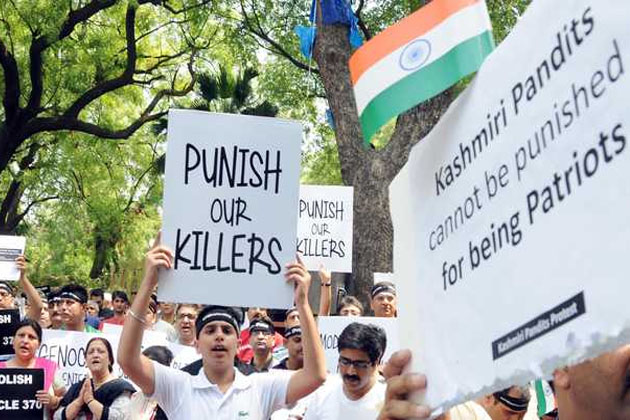*Shivani Bazaz (originally published on news18.com)
19th January, 1990 is commemorated as the day when Indian secularism was butchered in the valley of Kashmir. A day which still haunts a community for the tragedy it brought on that fateful night. Some call it the Kashmiri Pandit exodus day; others simply mark it as the beginning of a 26 year exile which shows no signs of ending any time soon. 19th January is more than just an anniversary though. It is also a day on which without fail the world wakes up to the plight of the pandits. A storm of people showing solidarity, politicians making promises and some people welcoming pandits back with open arms but as soon as the day passes with tragic inevitability, the pandits remain where they have been since 26 years now- in the middle of nowhere.
Many writers, Journalists, political pundits and people who stand for the cause of Kashmiri pandits continue writing and speaking about the issue but let’s accept the fact that no one seems to care. Seeing things transparently and putting the truth brutally, Kashmiri Pandits were displaced out of their homes during the armed insurgency in 1990, men were killed, women were raped and no one helped them, neither the state nor their ‘brothers’.

Living as “refugees in their own country” for nearly three decades the displaced pandits still can’t return to the Valley. Unfruitful debates on the TV channels, political promises, rhetoric and ignorance is ruining the cause of Kashmiri Pandits since more than two decades now.
On the record it seems the conditions are ripe for pandits’ grand homecoming. From politicians to the Muslim majority in the state of Jammu and Kashmir have welcomed the idea with open arms, and yet, it seems as distant as it has always been.
The two major problems in the return of the Kashmiri Pandits is New Delhi’s apathy and Islamist fundamentalism, says Yale World Fellow, Journalist and Author Rahul Pandita. He further adds: “The successive governments at the centre have not cared about how the Pandit community has lost its land, its habitat.”
Pandita sees the rising tide of Islamism in the Kashmir Valley as another threat and said that a majority of Kashmiri Muslims only open their arms for the Pandits when they go to their homeland as tourists. If there were a genuine concern indeed, there would have been at least an acknowledgement by now about what the majority did to the minority in Kashmir Valley in 1989-90.
Separatist ideology is another challenge when it comes to bringing harmony and normalcy to the valley. Siddaratha Giggo, author of ‘The Garden of Solitude’ and ‘A Long Dream of Home’ said, “Separatists oppose the idea of establishing a settlement for Pandits in Kashmir. Others say that Pandits are welcome to return. But how? If Pandits are to return to Kashmir and rebuild their houses, the people of Kashmir must create the conditions. Can Kashmiris rise above their divides, and pledge to create a Kashmir where everyone can thrive and co-exist?”
Among other reasons, trust deficit between the two communities plays the role of deepening the divide and making conditions hostile. Pawan Durani, a representative of Panun Kashmir, highlights how inaction has been the core of hindrance in the way of Kashmiri Pandit rehabilitation. Pawan says, “Has even a single person till date been convicted for killing of hundreds of Kashmiri Pandits? No. In absence of justice, how can we have the confidence to return? With open display of ISIS & Al Qaeda flags and thousands attending funeral of terrorists, how can we risk another generation of ours?”
These questions are hard hitting and sadly remain un-answered till date. While Kashmiri Pandits continue being the victims of not being a vote bank, governments in centre and state brush aside the silent screams of the community. Every year, the community remembers this day as a nightmare and hopes to go back to their homes some day. If these silent screams does not cower the nation, nothing will. The condition of Kashmiri Pandits in our nation today, proves that non-violence no longer remains the strongest tool.

No comments:
Post a Comment